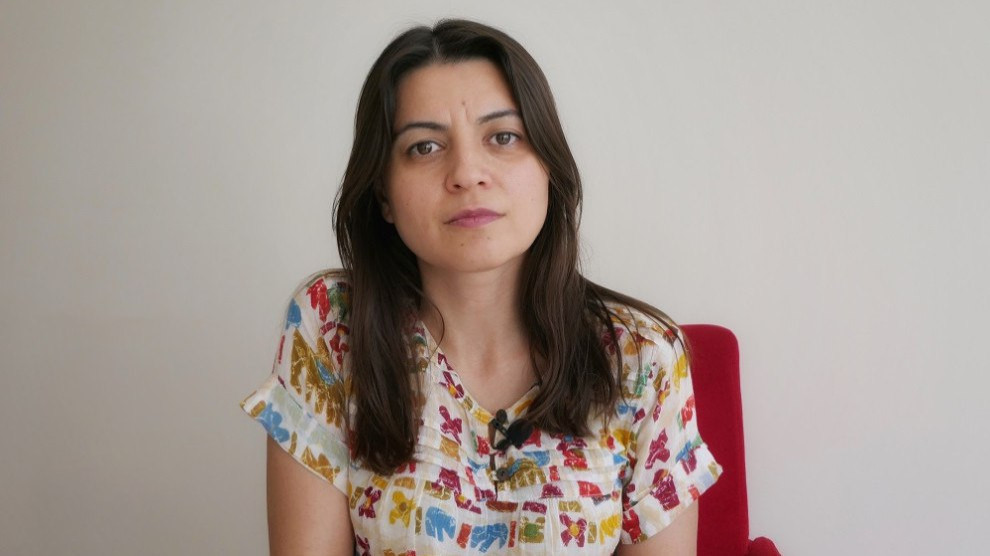Güney: Women journalists fight male language in media
"We have assumed a role and mission to change and transform the male mentality. We take this as a duty because this is a form of struggle for us."
"We have assumed a role and mission to change and transform the male mentality. We take this as a duty because this is a form of struggle for us."

Ayşe Güney, spokeswoman of the Mesopotamia Women Journalists Platform (MKGP) and Jinnews Turkish news editor, talked about killings of women and the language of the media.
Ayşe Güney underlined that only women are seen on the streets in the recent political environment. “If we were to give an example from the territory we live in, the main opposition force is women. Women constitute the dynamic of change. Therefore, it is women who play a decisive role. The women's struggle will be decisive for the course the process will take.”
Emphasizing that the action and activities carried out by women are reflected in the press from a male point of view, Güney said: “The media are actually replicating the words used by the government as if there was no Istanbul Convention, as if it was never signed. They do that so to create a perception regarding the Istanbul Convention."
Pointing out that journalists should serve the people and truth with the articles they write, Güney added: “But now most journalists and establishment media do not do this”.
Expressing that the main stream media are now the mouth of the government, Güney said: “Currently, seventy percent of the media are actually controlled or influenced by the government. Despite this, the government is still trying to eliminate opposition media by putting pressure on the, shutting newspapers and websites down, imposing restrictions on the news, ignoring or imposing restrictions on web media, detaining, arresting or fining journalists."
Emphasizing that even the murder of a woman by her husband was justified and defended by the media, Güney said: "We have to read things like ‘the man in a jealousy fit went and killed his wife’. In this case, the media use a language that accuses the woman and exonerates the man as if he was momentary 'insane'. We have to read things like ‘the woman was wearing shorts and was subjected to violence’. These kind of sentences we not only read in the papers but we hear them in court. The language of the media is transferred to the judiciary and the murdered woman is shown as if in fact it was her who committed a crime. But if a woman were in the same situation, she would be described as "murderous mother or murderous woman". In other words, the man can have a sudden explosion of anger and nerves, but the woman is a criminal."
Stressing that the media also uses a similar language for the women who defend the Istanbul convention, Güney said: “That's why we can see the judiciary in the media, there is no legal process. We decide whether someone is guilty or not by following the media. The media decides instead of the judiciary, judges, prosecutors.”
Güney said that journalists should use the language of the media correctly.
Stating that the responsibility is heavier when it comes to institutions that have taken on the role of women, such as Jinnews agency, Güney said: “Because we are the voices of those women whose voices are not heard… We will have to eliminate this manipulation; we will have to destroy it. Therefore, we will have to make women's voice louder."
Noting that the free press played an important role also when it came to the language of women’s struggle, Güney said, “The free press has reached a very important level in the change and transformation of the news language.
Noting that a very new breath has been brought to women's journalism, Güney added: “Women's visibility has been increased with our publishing principle. How did that happen? The woman had the opportunity to express herself in many fields, let alone the economy, culture and arts. Until now, women were considered as understanding nothing about economy.”
Reminding that Jinha was established in 2012 and that women's publishing continued with Şûjin and Jinnews after Jinha was closed by an emergency decree, Güney said that women's blogs and news sites increased and added that this was an important gain for women.
Mesopotamia Women Journalists Platform is another important place for women journalists and women-oriented journalism.
Güney ended her remarks by saying: “We have assumed a role and mission to change and transform the male mentality. So, for example, we need to sit down and discuss with male journalists, editors or program hosts. We take this as a duty because this is a form of struggle for us. We don't just do journalism. This is the field of struggle for us. Yes, our profession is journalism, yes we try to do this professionally, but basically this is also our struggle."